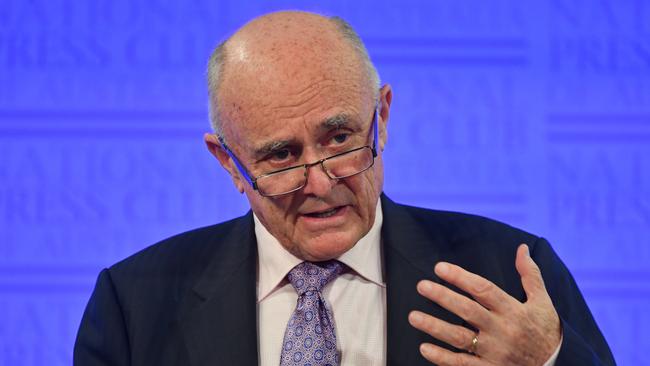Allan Fels fears relapse at banks after Hayne report

First there were rumblings about the role of senior counsel assisting, where reputations were trashed in final submissions that were completely ignored by Hayne in his final report.
Some of the targeted individuals never had the opportunity to respond to the serious allegations made against them.
The response has largely been a shrug of the shoulders, as if to say: “Oh well, there’s always collateral damage in a royal commission.”
The more persistent criticism has been that Hayne, despite his ferocious demeanour in the public hearings, blinked when it came to recommending the structural reforms required for lasting change.
Former Australian Competition and Consumer Commission chairman Allan Fels is in the latter category of critics.
In a biography ghostwritten by journalist Lucinda Schmidt, Fels says the royal commission has left a “plethora of unresolved problems and has relied too heavily on regulators and reform of bank culture to prevail”.
“I believe there is a considerable risk of relapse in a few years,” he says.
“The amounts of money involved are so great that the temptations for poor practices are enormous, and the best way of resolving the problem is with structural solutions and with measures that resolve remuneration conflicts.”
Fels harbours no doubts that a lot of time and effort is going into the transformation of bank culture.
However, he’s sceptical that about how long it will last.
For a start, significant recommendations from Hayne affect lower-level operatives, such as mortgage brokers and commission agents, which might or might not come to fruition.
If they don’t, Fels says, the output of the royal commission will have been “modest”.
As for the issues it didn’t canvass, the former competition tsar has a list, starting with the industry’s remediation practices, which have short-changed their customers, as well as the removal of conflicts between executive rewards and commission agents on the one hand, and consumers on the other.
Fels says that Hayne should have tackled the structural issue, where financial institutions offer products and services while at the same time providing supposedly impartial and independent advice on the best products and services in the market.
He acknowledges that most of the major banks are separating their advice businesses, but says these decisions can be reversed, as the break-up and reintegration of energy companies shows.

The royal commission, Fels says, has been an important exercise in the history of banking.
However, it’s likely to be overshadowed by two other developments — the growing scale of superannuation funds, which will soon be many times the size of banks.
Will they acquire banks? Will they gradually establish their own banking businesses? Where will the banks be in 20 years?
The second development is the likely entry of the big tech platforms — Google, Facebook, Amazon and Apple — into retail and, ultimately, into other forms of banking.
“The platforms may succeed in monopolising the organisation and distribution of loans to consumers and small business,” Fels says.
“They are helped by a factor that has not been present in other attempts to ‘beat the banks’ - the availability of customer data.”
gluyasr@theaustralian.com.au
Twitter: @Gluyasr





As the months tick by from royal commissioner Ken Hayne’s supposed evisceration of the banking industry, critics of the whole exercise are starting to find their voice.